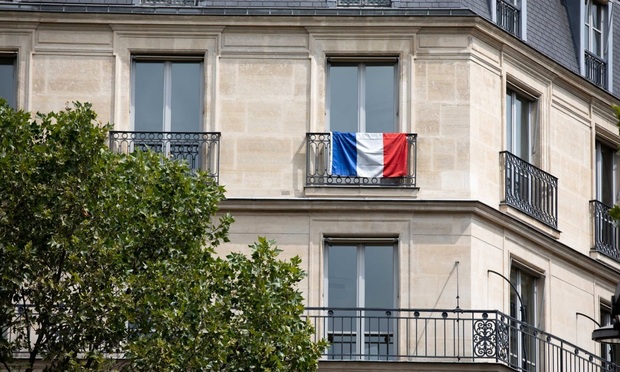Local Firms Drop Further Down France M&A Rankings
After worsening performance by French firms in 2018, only Bredin Prat makes this year's top 20 firms by M&A deal value, according to Mergermarket.
December 16, 2019 at 04:06 AM
6 minute read
Just one French firm has made it into the top 20 legal advisers on France-based M&A by deal value for 2019 so far, according to Mergermarket data.
Bredin Prat is 20th in the rankings for the year to mid-November after advising on 21 deals with a combined value of €5.7 billion, and is the sole French representative.
The firms taking the top five places for 2019, all U.S.- or U.K.-headquartered firms, are (in descending order): Latham & Watkins, which advised on 22 deals worth €22.3 billion in total, Weil, Gotshal & Manges, Sullivan & Cromwell, DLA Piper and Linklaters.
Two years ago, Bredin Prat topped the table, advising on 42 deals with a combined value of €68.9 billion. That year also saw fellow French firm Darrois Villey Maillot Brochier come in near the top, reaching third spot with 23 deals worth €57.4 billion.
Last year, Bredin Prat came fifth, advising on 26 deals worth €20.7 billion in total, while Darrois Villey Maillot Brochier went down to 20th, having worked on 14 deals worth €9.22 billion.
So what has happened to French firms during the past couple of years?
Cross-border capability gap
One French M&A partner working for a U.K.-headquartered international firm sounds a note of caution about drawing conclusions too quickly, pointing out that league tables can easily be skewed by a handful of very big deals.
In 2018, for example, Debevoise & Plimpton was able to pip Bredin Prat to fourth place in Mergermarket's rankings on the strength of just two French transactions that were worth a combined €21 billion. Bredin Prat, meanwhile, did 26 transactions that year, but these only came to a value of €20.7 billion in total.
For this reason, it is important, he says, to look at trends across a number of years. But, in light of the fact that French firms winning fewer M&A mandates appears to not be a one-off blip, the M&A partner adds that this may reflect the fact that firms like Bredin Prat, while offering top-notch French legal advice, are not equipped to tackle large international deals by themselves.
This, he says, has hampered them in a French market that during the past few years has seen a number of significant deals of this type.
One example is the merger between carmakers Peugeot and Fiat Chrysler, where Linklaters worked alongside Bredin Prat advising the former and Sullivan & Cromwell joined with Darrois Villey Maillot Brochier for the latter.
Other deals of this type include the recently announced addition of high-end American jeweller Tiffany to Paris-headed luxury conglomerate LVMH, which also involved Sullivan & Cromwell as an adviser, this time to Tiffany, with Skadden, Arps, Slate, Meagher & Flom on the other side.
Then there is also French/Italian eyewear brand EssilorLuxottica's acquisition of rival GrandVision, where legal advisers included Herbert Smith Freehills for EssilorLuxottica, Linklaters and De Brauw Blackstone Westbroek for GrandVision, Hogan Lovells for the banks financing the deal, and NautaDutilh for GrandVision's former owner HAL.
"Purely domestic work has reduced over time. That is the challenge that firms like Bredin Prat and Darrois Villey Maillot Brochier face"
This rise has not been accompanied by a similar one in large French-only M&A deals. "Purely domestic work has reduced over time," the M&A partner says. "That is the challenge that firms like Bredin Prat and Darrois Villey Maillot Brochier face. It does not mean that they are not good firms."
This is borne out by the fact that French firms have maintained a good performance in rankings by deal count, according to Mergermarket. This suggests they continue to be popular with clients undertaking smaller domestic deals.
For 2019's deal count table to mid-November, four French firms made the top 20. Lamartine Conseil, Gide Loyrette Nouel, De Pardieu Brocas Maffei and Bredin Prat come in at second, fourth, 14th and 17th respectively. This is a similar number to the previous two years.
Neither Bredin Prat or Darrois Villey responded to requests for comment.
2020 predictions
Whether this trend persists into 2020 may well depend on how the market performs. Some lawyers believe that the top end of France's M&A market will stay strong overall. But, in what could be bad news for French firms, this could be continue to be down to international rather than domestic deals. The desire of foreign investors to back French companies has proved to be resilient, they say, despite some wobbles over political unrest in France.
"At the end of last year, given the gilets jaunes protests, there were fewer transactions, and this was a concern," says Nataline Fleury, a partner at Gibson Dunn and head of the firm's Paris employment practice, where she focuses in particular on the employment aspects of M&A deals. "But what I have seen so far [this year] is that, despite [the gilets jaunes], there is now much more investment coming from foreign investors in France again. So we have seen much more transactional work coming in, and I think this will continue next year."
Other lawyers in France, however, see things unfolding differently. "This year has been very good with quite a lot of deals. But with a few exceptions, M&A transactions have reduced compared to what we had recently. It is difficult to predict what is going to happen next," says the M&A partner.
He thinks that the gilets jaunes situation and other ongoing protest movements in France, particularly those behind the current pension reform-related strikes, have had and could continue to have an effect on whether foreign investors choose to back French companies.
One sector of the French economy that has been particularly vulnerable in this regard, he says, is retail. "We have seen a number of bankruptcy proceedings affecting retailers including [supermarket chain] Casino and [furniture seller] Conforama. Because of Amazon, life was difficult for them already. But, on top of that, the gilets jaunes protests meant people could not go out shopping on a Saturday, so their turnover dropped instantly."
But domestic M&A, he says, has not been affected in the same way by social unrest. French buyers, says a Paris-based competition partner, "are less impressed than foreign ones by that kind of thing".
Corporate lawyers at French firms are unlikely to be found openly cheering any protestors on. But, if current demonstrations allow them to glide up the M&A rankings again, they may have reason to feel quietly thankful for them.
This content has been archived. It is available through our partners, LexisNexis® and Bloomberg Law.
To view this content, please continue to their sites.
Not a Lexis Subscriber?
Subscribe Now
Not a Bloomberg Law Subscriber?
Subscribe Now
NOT FOR REPRINT
© 2025 ALM Global, LLC, All Rights Reserved. Request academic re-use from www.copyright.com. All other uses, submit a request to [email protected]. For more information visit Asset & Logo Licensing.
You Might Like
View All
Paul Weiss Says Progress Means 'Embracing the Uncomfortable Reality'
5 minute read

GCs Say They are Getting 'Edged Out' of UK Boardrooms
Law Firms Mentioned
Trending Stories
- 1'It's Not Going to Be Pretty': PayPal, Capital One Face Novel Class Actions Over 'Poaching' Commissions Owed Influencers
- 211th Circuit Rejects Trump's Emergency Request as DOJ Prepares to Release Special Counsel's Final Report
- 3Supreme Court Takes Up Challenge to ACA Task Force
- 4'Tragedy of Unspeakable Proportions:' Could Edison, DWP, Face Lawsuits Over LA Wildfires?
- 5Meta Pulls Plug on DEI Programs
Who Got The Work
Michael G. Bongiorno, Andrew Scott Dulberg and Elizabeth E. Driscoll from Wilmer Cutler Pickering Hale and Dorr have stepped in to represent Symbotic Inc., an A.I.-enabled technology platform that focuses on increasing supply chain efficiency, and other defendants in a pending shareholder derivative lawsuit. The case, filed Oct. 2 in Massachusetts District Court by the Brown Law Firm on behalf of Stephen Austen, accuses certain officers and directors of misleading investors in regard to Symbotic's potential for margin growth by failing to disclose that the company was not equipped to timely deploy its systems or manage expenses through project delays. The case, assigned to U.S. District Judge Nathaniel M. Gorton, is 1:24-cv-12522, Austen v. Cohen et al.
Who Got The Work
Edmund Polubinski and Marie Killmond of Davis Polk & Wardwell have entered appearances for data platform software development company MongoDB and other defendants in a pending shareholder derivative lawsuit. The action, filed Oct. 7 in New York Southern District Court by the Brown Law Firm, accuses the company's directors and/or officers of falsely expressing confidence in the company’s restructuring of its sales incentive plan and downplaying the severity of decreases in its upfront commitments. The case is 1:24-cv-07594, Roy v. Ittycheria et al.
Who Got The Work
Amy O. Bruchs and Kurt F. Ellison of Michael Best & Friedrich have entered appearances for Epic Systems Corp. in a pending employment discrimination lawsuit. The suit was filed Sept. 7 in Wisconsin Western District Court by Levine Eisberner LLC and Siri & Glimstad on behalf of a project manager who claims that he was wrongfully terminated after applying for a religious exemption to the defendant's COVID-19 vaccine mandate. The case, assigned to U.S. Magistrate Judge Anita Marie Boor, is 3:24-cv-00630, Secker, Nathan v. Epic Systems Corporation.
Who Got The Work
David X. Sullivan, Thomas J. Finn and Gregory A. Hall from McCarter & English have entered appearances for Sunrun Installation Services in a pending civil rights lawsuit. The complaint was filed Sept. 4 in Connecticut District Court by attorney Robert M. Berke on behalf of former employee George Edward Steins, who was arrested and charged with employing an unregistered home improvement salesperson. The complaint alleges that had Sunrun informed the Connecticut Department of Consumer Protection that the plaintiff's employment had ended in 2017 and that he no longer held Sunrun's home improvement contractor license, he would not have been hit with charges, which were dismissed in May 2024. The case, assigned to U.S. District Judge Jeffrey A. Meyer, is 3:24-cv-01423, Steins v. Sunrun, Inc. et al.
Who Got The Work
Greenberg Traurig shareholder Joshua L. Raskin has entered an appearance for boohoo.com UK Ltd. in a pending patent infringement lawsuit. The suit, filed Sept. 3 in Texas Eastern District Court by Rozier Hardt McDonough on behalf of Alto Dynamics, asserts five patents related to an online shopping platform. The case, assigned to U.S. District Judge Rodney Gilstrap, is 2:24-cv-00719, Alto Dynamics, LLC v. boohoo.com UK Limited.
Featured Firms
Law Offices of Gary Martin Hays & Associates, P.C.
(470) 294-1674
Law Offices of Mark E. Salomone
(857) 444-6468
Smith & Hassler
(713) 739-1250










